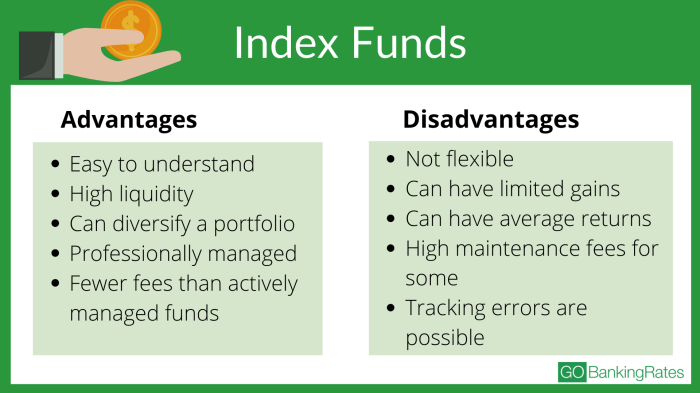Diving into the world of index fund advantages, we uncover the key benefits that make these investment options stand out. From cost efficiency to diversification benefits, index funds offer a unique approach to investing that appeals to both beginners and seasoned investors alike. Let’s explore why index funds are gaining popularity in the financial market.
Index Fund Definition
An index fund is a type of investment fund that aims to replicate the performance of a specific market index, such as the S&P 500 or the Dow Jones Industrial Average. Unlike actively managed funds, which involve a team of fund managers making decisions on which assets to buy and sell, index funds passively track a predetermined index.
Passive Investing and Index Funds
Passive investing involves buying and holding a diversified portfolio of assets with the goal of achieving long-term returns that mirror the overall market performance. Index funds are a popular choice for passive investors because they offer broad market exposure at a low cost.
Popular Index Funds
- Vanguard Total Stock Market Index Fund (VTSAX)
- iShares Core S&P 500 ETF (IVV)
- Schwab S&P 500 Index Fund (SWPPX)
Cost Efficiency of Index Funds

When it comes to investing, cost efficiency is key, and index funds are known for their lower expense ratios compared to actively managed funds. These expense ratios represent the annual fees investors pay to cover fund management and operating expenses.
Reduced trading activity in index funds is another factor contributing to their cost efficiency. Since index funds aim to replicate the performance of a specific index, such as the S&P 500, they do not require frequent buying and selling of securities. This results in lower transaction costs, ultimately benefiting investors by keeping expenses down.
Comparison with Other Investment Options
Index funds offer a cost-effective investment option compared to actively managed funds, which often come with higher expense ratios due to the active management involved. Additionally, index funds typically have lower turnover rates, leading to lower capital gains taxes for investors. When compared to individual stock picking or other complex investment strategies, index funds provide a simple and affordable way to diversify and participate in the broader market’s growth.
Diversification Benefits
Index funds provide investors with diversification benefits by offering broad market exposure through tracking a specific index. This means that by investing in an index fund, you are essentially investing in a wide range of companies within that index, spreading out your investment across various sectors and industries.
Diversification within an index fund can help reduce risk compared to investing in individual stocks. Since the fund holds a large number of stocks that represent different sectors of the market, the impact of a single stock’s poor performance is minimized. This diversification can help protect your investment from significant losses that may occur if you were heavily invested in just a few individual stocks.
Indexes Tracked by Popular Index Funds
- S&P 500: This index tracks the performance of 500 of the largest publicly traded companies in the United States. Investing in an S&P 500 index fund provides exposure to a wide range of industries, including technology, healthcare, financials, and consumer goods.
- Dow Jones Industrial Average (DJIA): The DJIA tracks the performance of 30 large, publicly traded companies in the US. Investing in a fund that tracks the DJIA offers diversification benefits by spreading your investment across companies in various sectors, such as technology, retail, and energy.
- NASDAQ-100: This index includes 100 of the largest non-financial companies listed on the NASDAQ stock exchange. Investing in a NASDAQ-100 index fund provides exposure to technology, consumer discretionary, healthcare, and other sectors, offering diversification benefits to investors.
Performance Consistency
Index funds aim to match the performance of the underlying index, providing a consistent investment option for investors looking to track market performance over time. This consistency can be crucial for long-term investment strategies, as it helps reduce the impact of market volatility and provides a steady return on investment.
Historical Performance Comparison
When comparing the historical performance of index funds to actively managed funds, index funds have shown to outperform actively managed funds over the long term. This is mainly due to lower fees and expenses associated with index funds, as well as the passive nature of their investment strategy. Actively managed funds often struggle to consistently beat the market after accounting for fees and expenses, making index funds a more attractive option for many investors.
- Index funds have consistently delivered competitive returns compared to actively managed funds, with lower costs and fees.
- Over longer time horizons, index funds have shown to provide more stable and predictable returns, making them a reliable choice for investors.
- The passive management style of index funds helps reduce the risk of underperformance and offers a more consistent investment experience.
Investors can benefit from the reliable and steady performance of index funds, which can help them achieve their long-term financial goals with less volatility.